FAMILY EXCLUSION—NOT IN MY POLICY!
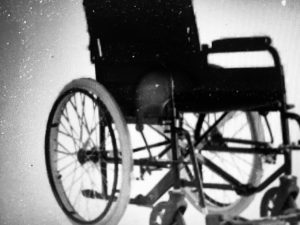 Don’t ever buy insurance with a family exclusion. Here’s how it worked for a recent client of mine:
Don’t ever buy insurance with a family exclusion. Here’s how it worked for a recent client of mine:
Mom was driving, didn’t pay attention to the slippery conditions of a Maryland winter, and her car slid into oncoming traffic. Her vehicle was totaled, and more devastatingly, one of her twins the back car-seat was catastrophically injured. She had brain damage, requires a feeding tube, and now needs 24-hour care. Thinking they had done the right thing when they purchased GEICO insurance, their policy provided for $250,000.00 if they injured someone else, or if someone without insurance injured them.
However, there was a caveat that they didn’t pay attention to: if a family member was injured because of the negligence of another family member, the most the insurance would pay out is $30,000.00. That’s $30,000.00 for nursing care, medicine, therapies, wheelchairs, disability vans, and ramps to the front door. From a legal perspective, it was easy—the insurance company offered $30,000.00 without much more evidence than the initial hospital bill. From an emotional and financial perspective, however, it was devastating. The family needed to go on public benefits, which do not provide nearly the level of care that sweet girl deserves.
 Maryland Car Accident Lawyer Blog
Maryland Car Accident Lawyer Blog


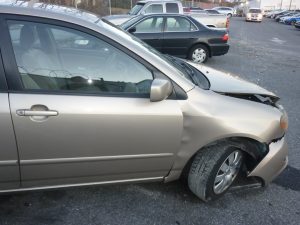 Insurance is an interesting thing. You pay regularly (monthly, or semi-annually) to protect your family when they get hurt, and to protect other people that you may accidentally hurt. However, many of our clients are steadfast in their efforts to avoid using their own car insurance at any cost, fearing an increase in their insurance rates. What’s the point of having insurance if you don’t use it when you need it?
Insurance is an interesting thing. You pay regularly (monthly, or semi-annually) to protect your family when they get hurt, and to protect other people that you may accidentally hurt. However, many of our clients are steadfast in their efforts to avoid using their own car insurance at any cost, fearing an increase in their insurance rates. What’s the point of having insurance if you don’t use it when you need it?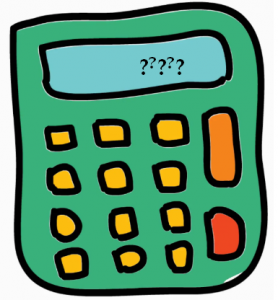 Every now and then we get a call from someone who has been slugging it out with the insurance company on their own in an effort to save legal fees and handle it themselves. These calls often come at the time that negotiation is wrapping up because the callers want some advice about whether the settlement offer is a good one. We try to be helpful to people who call us, and we take the position that lawyers should be responsible members of the community, so we will usually try to give some helpful general advice. The truth that some lawyers won’t tell you is that yes, you can settle your own personal injury case. Here are some criteria to determine whether you forgo a lawyer and
Every now and then we get a call from someone who has been slugging it out with the insurance company on their own in an effort to save legal fees and handle it themselves. These calls often come at the time that negotiation is wrapping up because the callers want some advice about whether the settlement offer is a good one. We try to be helpful to people who call us, and we take the position that lawyers should be responsible members of the community, so we will usually try to give some helpful general advice. The truth that some lawyers won’t tell you is that yes, you can settle your own personal injury case. Here are some criteria to determine whether you forgo a lawyer and 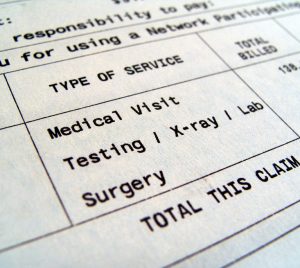 An Authorization and Assignment (frequently abbreviated as an “A&A,” or called a “letter of protection,”) happens when a medical provider agrees to hold off on collections proceeding until after a personal injury case is resolved (whether by way of settlement or a verdict).
An Authorization and Assignment (frequently abbreviated as an “A&A,” or called a “letter of protection,”) happens when a medical provider agrees to hold off on collections proceeding until after a personal injury case is resolved (whether by way of settlement or a verdict).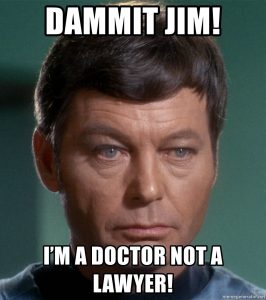 Frequently, new clients ask me where they should go to the doctor. I give the usual disclaimer—I’m a lawyer, not a doctor (it’s a reverse Leonard McCoy, M.D.). But, I can offer suggestions.
Frequently, new clients ask me where they should go to the doctor. I give the usual disclaimer—I’m a lawyer, not a doctor (it’s a reverse Leonard McCoy, M.D.). But, I can offer suggestions. Pre-settlement loans are the scourge of plaintiffs’ lawyers for a couple of reasons. The first is that they take so much time—shepherding an application from beginning to end, working out details of the money transfer, and making it all happen in time to help the client with the financial emergency that they are having—it can easily add hours to a case. That wouldn’t be so bad, but for the second reason—loans are often an expensive waste of money for our otherwise deserving clients.
Pre-settlement loans are the scourge of plaintiffs’ lawyers for a couple of reasons. The first is that they take so much time—shepherding an application from beginning to end, working out details of the money transfer, and making it all happen in time to help the client with the financial emergency that they are having—it can easily add hours to a case. That wouldn’t be so bad, but for the second reason—loans are often an expensive waste of money for our otherwise deserving clients.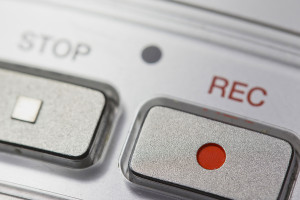 I saw a generic internet article about what not to say to your insurance company. It dealt with all types of insurance claims, but there are a few things it got right for auto claims. Here is what you should remember:
I saw a generic internet article about what not to say to your insurance company. It dealt with all types of insurance claims, but there are a few things it got right for auto claims. Here is what you should remember: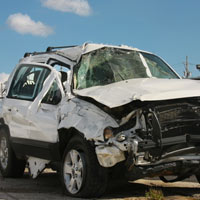 When an auto case settles, or after the judge or jury give a verdict in your favor, the insurance company will send your lawyers a check. Your lawyers will ask your permission to sign your name to the check, and they will deposit it in an escrow account. The escrow account is one of the safest, most regulated parts of lawyering. Lawyers can lose their ability to practice law if they don’t handle the escrow account exactly right. It is a near-sacred duty to the client.
When an auto case settles, or after the judge or jury give a verdict in your favor, the insurance company will send your lawyers a check. Your lawyers will ask your permission to sign your name to the check, and they will deposit it in an escrow account. The escrow account is one of the safest, most regulated parts of lawyering. Lawyers can lose their ability to practice law if they don’t handle the escrow account exactly right. It is a near-sacred duty to the client.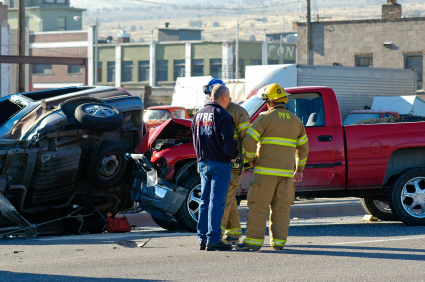 An automobile accident can turn your life upside down. There’s so much to do–find reliable transportation, get to the doctor, deal with insurance companies, and survive missed work. The easiest way to know if you have a claim is to consult with a lawyer–don’t let the insurance company convince you that you have a claim (they are, after all, looking out for their own best interests).
An automobile accident can turn your life upside down. There’s so much to do–find reliable transportation, get to the doctor, deal with insurance companies, and survive missed work. The easiest way to know if you have a claim is to consult with a lawyer–don’t let the insurance company convince you that you have a claim (they are, after all, looking out for their own best interests). 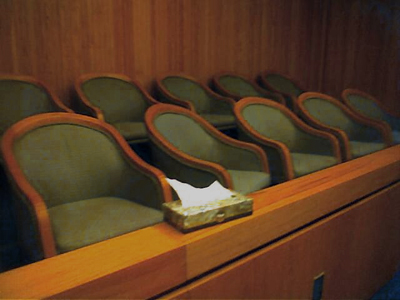 So your lawyer made a claim to the insurance company, and the case didn’t settle. Cases don’t settle for several reasons, including:
So your lawyer made a claim to the insurance company, and the case didn’t settle. Cases don’t settle for several reasons, including: